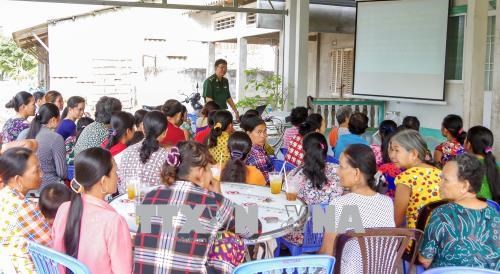Lawmakers review anti-human trafficking regulations
The National Assembly’s Judicial Committee discussed the implementation of anti-human trafficking regulations between 2012 and 2017 at its ongoing 10th plenary session in Hanoi on August 23.
 A military officer is talking with residents about anti-human trafficking. (Source: VNA)
A military officer is talking with residents about anti-human trafficking. (Source: VNA)Hanoi (VNA) – The National Assembly’s Judicial Committee discussed the implementation of anti-human trafficking regulations between 2012 and 2017 at its ongoing 10th plenary session in Hanoi on August 23.
According to official statistics, the period saw 3,090 people suspected of being trafficked, of whom 2,571 had returned. More than 90 percent of the victims were women and children, the majority of whom were from ethnic minorities in rural or remote areas.
About 80 percent of female victims encountered forced marriages and sexual exploitation overseas, while others were sold for the purpose of forced labour. Traffickers were often criminals with a human-trafficking history or foreigners working with Vietnamese partners to form trans-border networks of human trafficking.
The police had taken criminal proceedings against 1,021 cases with 2,035 suspects. The figures accounted for 97.3 percent of the total cases reported and handled by the police.
At the session, Nguyen Van Pha, deputy head of the committee, presented the committee’s report and updated participants on new people-trafficking methods employed by traffickers. There is now a growing trend amongst human traffickers of approaching their targets via social networks and smart phones, rather than direct meetings as they had previously.
Participants said it is hard to detect traffickers and investigate them, adding that many cases were only uncovered a long time after victims had been smuggled overseas.
Many attributed shortcomings in the anti-human trafficking work to ineffective communication campaigns in localities, particularly for residents in remote and rural areas.
Minister of Labour, War Invalids, and Social Affairs Dao Ngoc Dung agreed that stepping up public awareness activities is a must, as many localities have yet to pay proper attention to the matter.
On a separate matter, he also recommended during the plenary session that local authorities should focus on poverty alleviation, illiteracy eradication, and the betterment of local livelihoods, particularly ethnic people.–VNA













